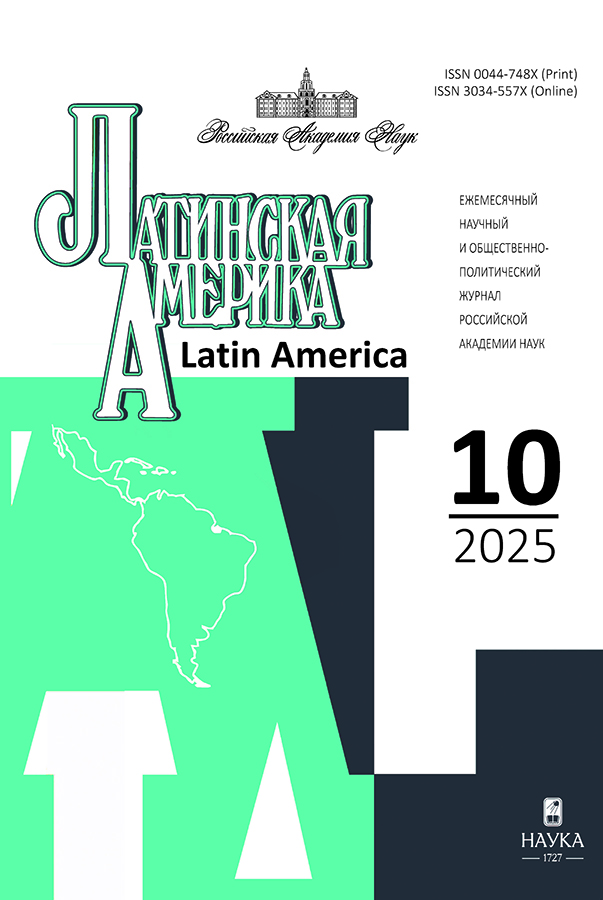№ 10 (2024)
Экономика
Новая экономическая политика Бразилии
Аннотация
В данной статье представлен критический анализ основных экономических программ, принятых в Бразилии в первые полтора года правления Луиса Инасиу Лулы да Силвы (2023 г. — первая половина 2024 г.), которые будут определять стратегию развития страны на ближайшее десятилетие. Особое внимание уделено диагностике нынешнего состояния промышленности и инфраструктуры Бразилии, анализу причин деиндустриализации, оценке возможностей и рисков усиления роли государства в модернизации промышленности и реализации масштабных инфраструктурных проектов. Авторы полагают, что успех новых программ будет зависеть от эффективности управления государственными ресурсами, совершенствования планирования и осуществления проектов, от расширения взаимодействия и контроля на федеральном и субрегиональном уровнях.
Латинская Америка. 2024;(10):6-20
 6-20
6-20


Политика, социальные проблемы
Бразилия: новые ориентиры культурной политики
Аннотация
Статья посвящена новым ориентирам культурной политики правительства президента Бразилии Луиса Инасиу Лулы да Силвы, которые были определены после выборов 2023 г. Излагаются основные задачи, поставленные в этой сфере, алгоритмы и сроки выполнения этих задач. Особо подчеркивается первостепенная роль воссозданного министерства культуры в деле осуществлении заявленных целей. Значительное внимание уделяется формированию законодательной базы, на основе которой будет проводиться новая культурная политика. Дается оценка достигнутых результатов за первые 100 дней правления Лулы. Представлена также хронология наиболее значимых событий в сфере культурной политики в 2024 г. В заключительной части рассматриваются как положительные аспекты проделанной работы, так и риски, которые необходимо учитывать в ходе осуществления поставленных задач.
Латинская Америка. 2024;(10):21-33
 21-33
21-33


Международные отношения
Экономические позиции государств Евросоюза в Латинской Америке Опыт Испании и Германии
Аннотация
Целью данной статьи является выявление особенностей экономического сотрудничества стран Евросоюза (ЕС) и Латино-Карибской Америки (ЛКА). Особое внимание уделено Испании и Германии — государствам, которые в последние годы в условиях переформатирования мирового порядка явно намерены укреплять экономические связи с латиноамериканским регионом. В статье на основе сравнительного анализа показано, что стратегии и кейсы Испании и Германии в ЛКА различаются. Автор делает вывод о том, что государства Евросоюза возвращаются в Латинскую Америку каждый раз тогда, когда у ЕС возникает в этом особая экономическая потребность.
Латинская Америка. 2024;(10):34-52
 34-52
34-52


Страницы истории
Дискуссия о доколумбовых связях Восточной Азии и Южной Америки Некоторые юбилейные даты
Аннотация
В статье рассматривается история эволюции взглядов на происхождение гончарства на южноамериканском континенте, начиная с появления гипотезы «дзёмон-вальдивия» и событий, которые предшествовали и способствовали этому, докладам и участникам 31-го Международного конгресса американистов 1954 г., посвященных культурам тихоокеанского побережья. Особое внимание уделено открытию памятника Реаль-Альто в 1974 г. и новым, в связи с этим, версиям происхождения керамики в Южной Америке, а также вкладу российских ученых в эту дискуссию.
Латинская Америка. 2024;(10):53-64
 53-64
53-64


Отношения СССР и стран Латинской Америки глазами советского дипломата Юрия Павлова
Аннотация
В статье исследуется исторический источник личного происхождения — интервью бывшего советского дипломата Юрия Ивановича Павлова, которое он дал в 1999 г. сотрудникам Архива национальной безопасности США. Дипломаты — проводники внешней политики государства, их роль была весьма значительна во все времена, особенно серьезной она стала в период холодной войны, когда от деятельности представителей двух антагонистических блоков — НАТО и ОВД — зависела судьба всего мира. Поэтому изучение источников, отражающих деятельность сотрудников внешнеполитических ведомств, крайне важно для понимания того, как они относились к своей работе. Воспоминания Павлова особенно ценны, учитывая тот факт, что такого рода материалов очень мало. Цель данного исследования — дать оценку взглядам Павлова на внешнюю политику СССР. В его ответах нашли отражение настроения группы дипломатов, разочаровавшихся во внутренней и внешней политике своей страны. Сама жизнь Павлова показывает, как менялись взгляды представителей дипломатического сообщества: от убежденных коммунистов в 1950-е годы (когда началась дипломатическая служба объекта интервью), до «шестидесятников», которые зачастую относились к действиям своей страны негативно.
Латинская Америка. 2024;(10):65-78
 65-78
65-78


Культура
Утопический дискурс в латиноамериканской культуре
Аннотация
В статье рассматривается утопический дискурс в культуре стран Латинской Америки конца XX — начала XXI вв. Трактовка утопии как одного из маркеров латиноамериканской идентичности заставляет с особым вниманием отнестись к этому феномену. Анализ латиноамериканской утопической традиции демонстрирует не только интенсивность утопического мышления на континенте, но и продуктивность его осмысления в трудах региональных авторов. Концептуальный рост общей латиноамериканской рефлексии об утопии связан с ее практическим аспектом, что расходится с англосаксонской традицией мысли, увековечивающей утопию в качестве литературного жанра. Использованная в статье методология текстологического и кросс-культурного анализа позволила выявить присущие латиноамериканской традиции исследования утопии главные имена (Альфонсо Рейес, Артуро Андрес Роиг, Орасио Черутти Гулдберг, Фернандо Аинса и др.) и оригинальные образы-концепты («лаборатория европейских утопий», «утопия для других» и «наше право на утопию», «утопическая функция»), а также обозначить исследовательские парадигмы и научные школы.
Латинская Америка. 2024;(10):79-92
 79-92
79-92


Латиноамериканское турне Евгения Евтушенко (1968) Уругвай. Колумбия. «Завоевание душ»
Аннотация
В 1967—1968 гг. Евгений Евтушенко находился в большой латиноамериканской командировке, за пять месяцев объездив с выступлениями Чили, Уругвай, Колумбию и Мексику. В нынешней статье мы продолжаем публиковать комментированный отчет поэта из этого турне. Отчет написан весной 1968 г. для внутреннего пользования Союза писателей, причем последнее, разумеется, подразумевало передачу документа в ЦК, о чем командируемому было хорошо известно. После дружественного Чили* Евтушенко описывает менее знакомые для советской культурной дипломатии страны, Уругвай и Колумбию, где еще только предстояло «завоевание душ, которые исподволь тянутся к нам». Об обеих странах он пишет значительно меньше, чем о Чили: о первой из-за непродолжительного пребывания, а о второй, вероятно, потому, что значительную часть времени, проведенного в Колумбии, заняли личные отношения, в которых ни Союзу писателей, ни тем более ЦК признаваться было никак нельзя.
Латинская Америка. 2024;(10):93-105
 93-105
93-105


Научная жизнь
 106-110
106-110












